Introduction
The search for reliable grid-scale energy storage that does not necessitate massive civil engineering projects continues.
As last year’s euphoria over compressed air energy storage has deflated, current bets are on shipping containers full of lithium-ion batteries.
However, another technology has some potential. Flow batteries aren’t yet common, but they have a worldwide influence, attract investment, and appear to work. Flow Batteries can be used to optimise stored energy usage and save money because of their ability to store and release energy over a long period. At the same time, the Flow Battery system represents energy supply stability and sustainability. It protects against failures, which is vital in the industrial sector and key infrastructure, and is well-suited to balance the volatility of renewable energy sources.
Energy Storage Market
By 2025, the global deployment of grid-connected energy storage will reach 15.1 GW. For opportunities in technology, most lithium-ion energy storage systems economically max out at 4 to 6 hours, leaving a gap in the market.
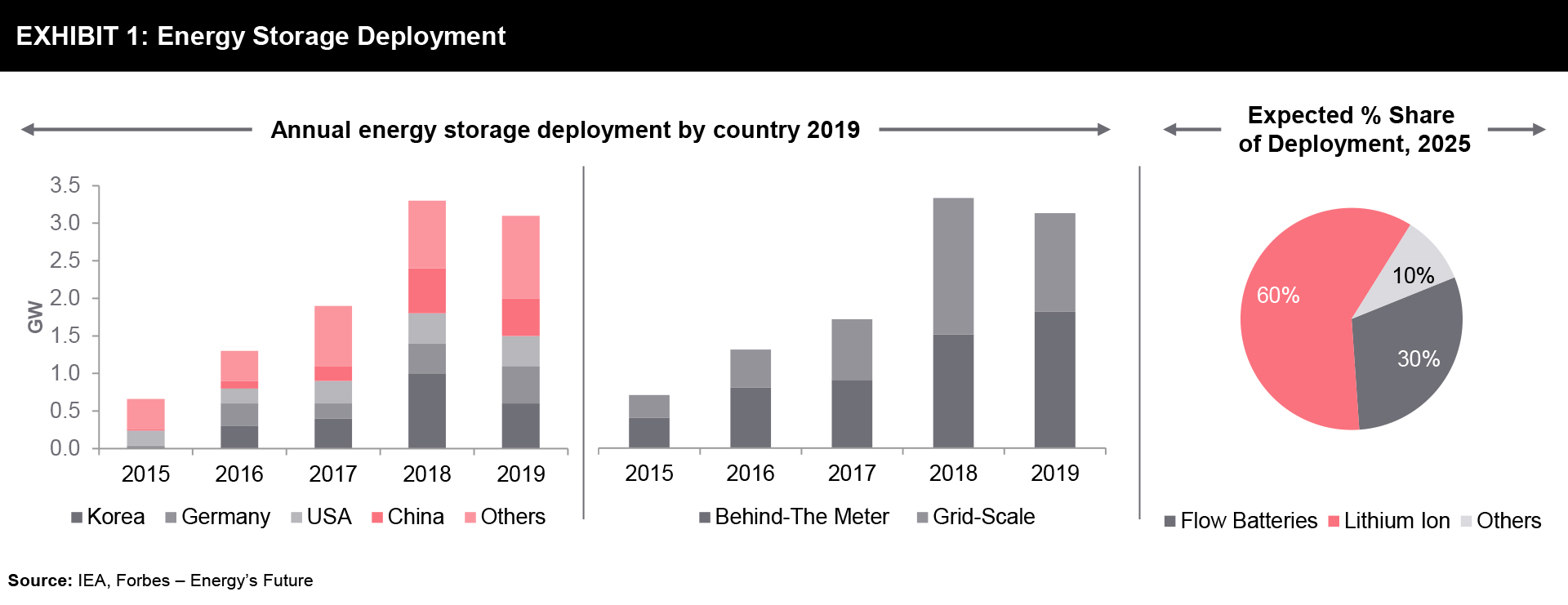

- In 2019 approximately 2.9 GW of storage capacity was added, which is 30% less than in 2018. The major factor behind this was that storage remains an early-stage technology and is heavily dependent on policy support
- The lithium-Ion battery will remain the dominant technology, owing to a price drop of over 80% from 2010 to 2017 ($/kWh); however, when it comes to scaling up and scaling fast Flow Batteries outshine Lithium-Ion batteries
- According to some estimates, there was a 17% decrease in energy storage deployment in the first half of 2020. However, this picked up towards the end of the second half leading to increasing in variable renewable penetration and the power market transition
Flow Batteries
Flow batteries have huge potential in the future owing to their long lifetime, long-duration storage, and better fire safety. Therefore there are many research activities taking place in this space.
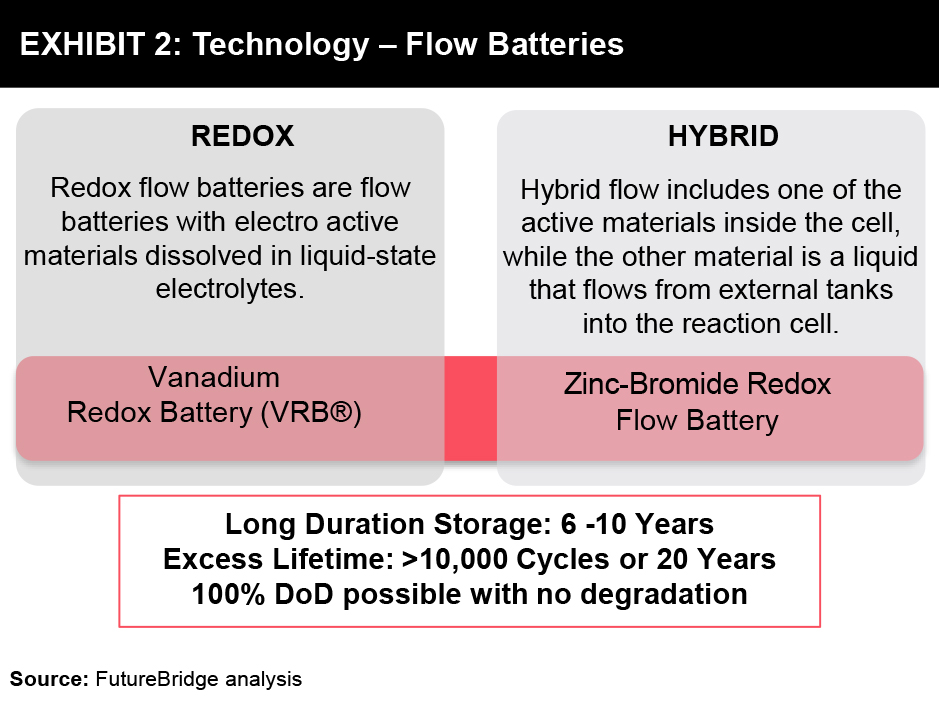

- Flow batteries are rechargeable batteries based on two chemical components dissolved in the liquid contained within the system, separated by a membrane.
- All flow battery components are recyclable, even the metals, and there are no explosive or flammable materials.
- These batteries can be almost instantly recharged by replacing the electrolyte liquid while simultaneously recovering the spent material for re-energisation.
Flow batteries have certain advantages over Lithium-Ion batteries:
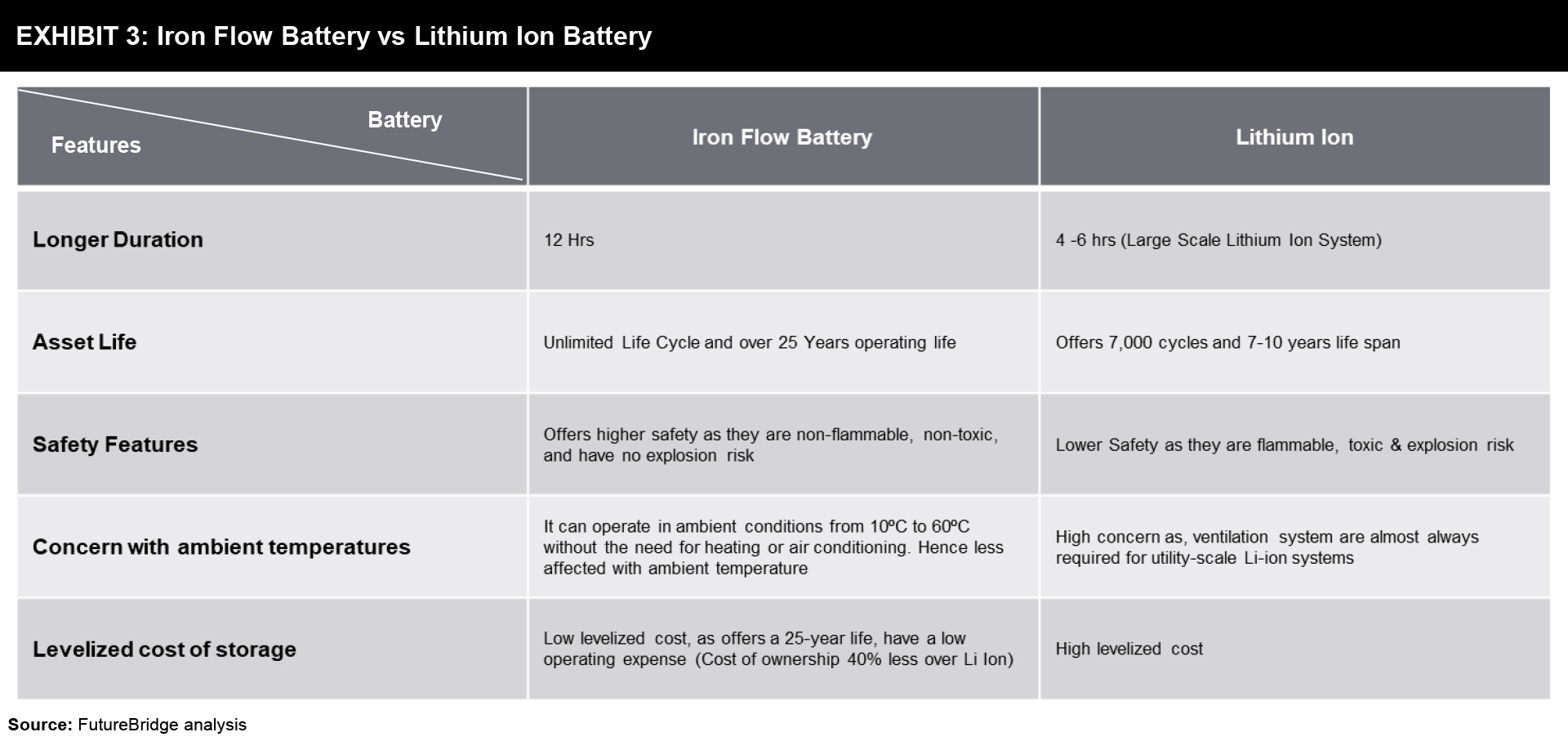

Flow Batteries- Applications
Flow batteries have a considerable advantage over lithium-Ion in Grid-Scale applications for Frequency Restoration and Load Leveling.
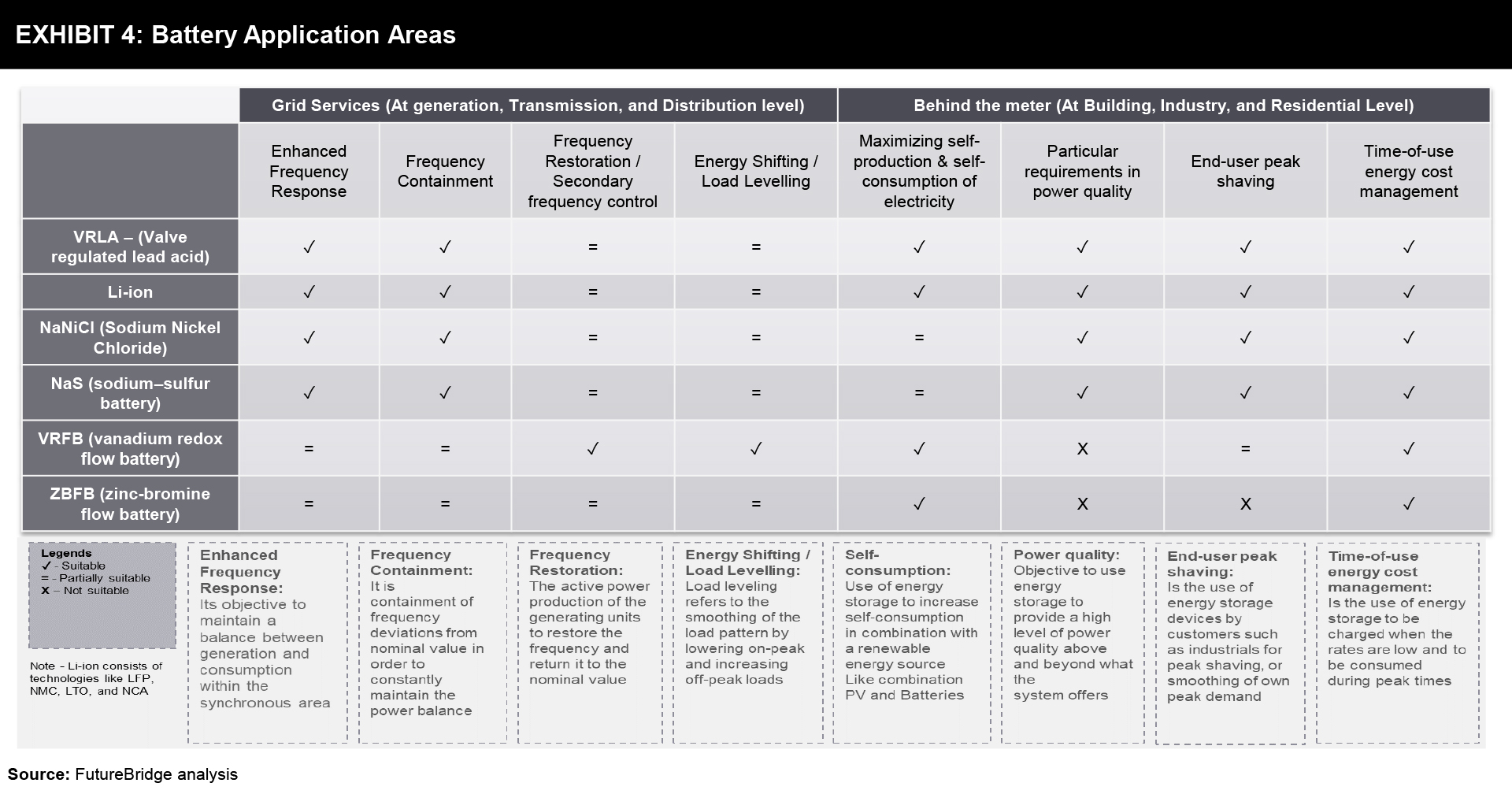

Future of Flow Batteries and Investments
Asia-Pacific to Dominate the Market going forward
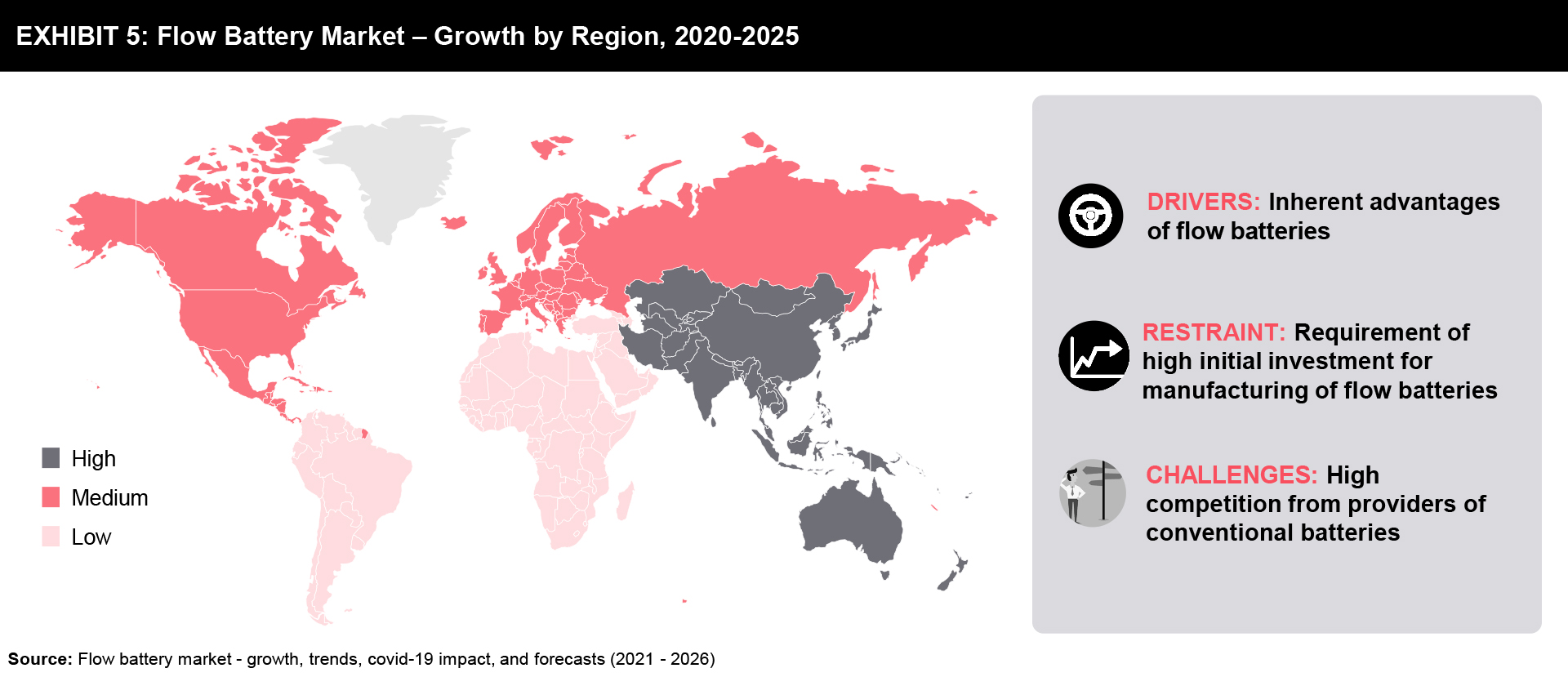

- The Asia-Pacific market is likely to dominate the flow battery market as it has multiple operating flow battery installations with substantial power ratings.
- Countries such as China, India, Japan, and Australia are pursuing battery technology to increase their large-scale energy storage capacity, which could improve electric stability.
- Compared to other nations in the Asia-Pacific region, China had the biggest installed capacity of flow batteries in 2018.
- In 2021, Yadlamalka Energy started an innovative renewable energy project in South Australia, comprising co-located Vanadium Flow battery energy storage (2MW – 8MWh AC) and Solar Photovoltaic (PV) farm (6MWp DC), integrated behind a DC-coupled inverter.
- AVL received a $3.69 million federal grant in July 2021 to design, build, and operate a $7.4 million commercial vanadium battery electrolyte plant and develop vanadium redox flow battery prototypes for both off-grid and residential applications. According to the grant’s terms, the manufacturing project must be finished by March 31, 2024.
Vanadium Redox Flow batteries have shown considerable potential in substantial cost reduction in the system unit price, owing to their capability to operate over more than 10,000 charges
- Vanadium redox flow batteries
- Vanadium redox flow batteries provide long lifetimes with a proven capability to operate over more than 10,000 charges and the ability to decouple power and energy.
- Vanadium Redox flow batteries have a high potential for substantial cost reduction (including reactants, electrolytes, membrane, and materials), a better lifetime of the membrane, and possible improvements in power and energy density.
- Zinc Bromine Flow batteries
- Zinc Bromine Flow batteries are the best-known hybrid flow batteries. They offer one of the highest cell voltages and release two electrons per atom of zinc. These attributes combine to provide the highest energy density among flow batteries.
- The battery systems can be recharged from 1,000 to 10,000 times with a continuous release of energy at a high rate of discharge for up to 10 hours or more




Will Flow Batteries overthrow Lithium Ion?
There is a lot to think about, and it isn’t easy to come to any conclusion yet:
- Do flow batteries degrade more slowly than Li-ion batteries? Yes, it looks like they do in some circumstances, as long as they are constructed and operated to minimize other sources of degradation.
- Are they more secure? This appears to be correct, as a catastrophic flow battery failure is unlikely to result in a hazardous fire with the toxic fumes associated with Li-ion failures. Inflow batteries, however, handling all of the liquid electrolytes is much more complex and, if not properly managed, can leak; this isn’t something one will find in most Li-ion systems.
- Finally, are flow batteries better for applications that last longer than 6 hours? Li-ion systems can run for extended periods by adding more batteries (with the added benefit of a higher power, if needed); therefore, it comes down to a cost comparison, and only time will tell whether flow batteries can keep up with the rapidly declining costs of Li-ion.
However, considerable investments by big corporates and financial Institutions do make a good case for Flow Batteries in ESS:
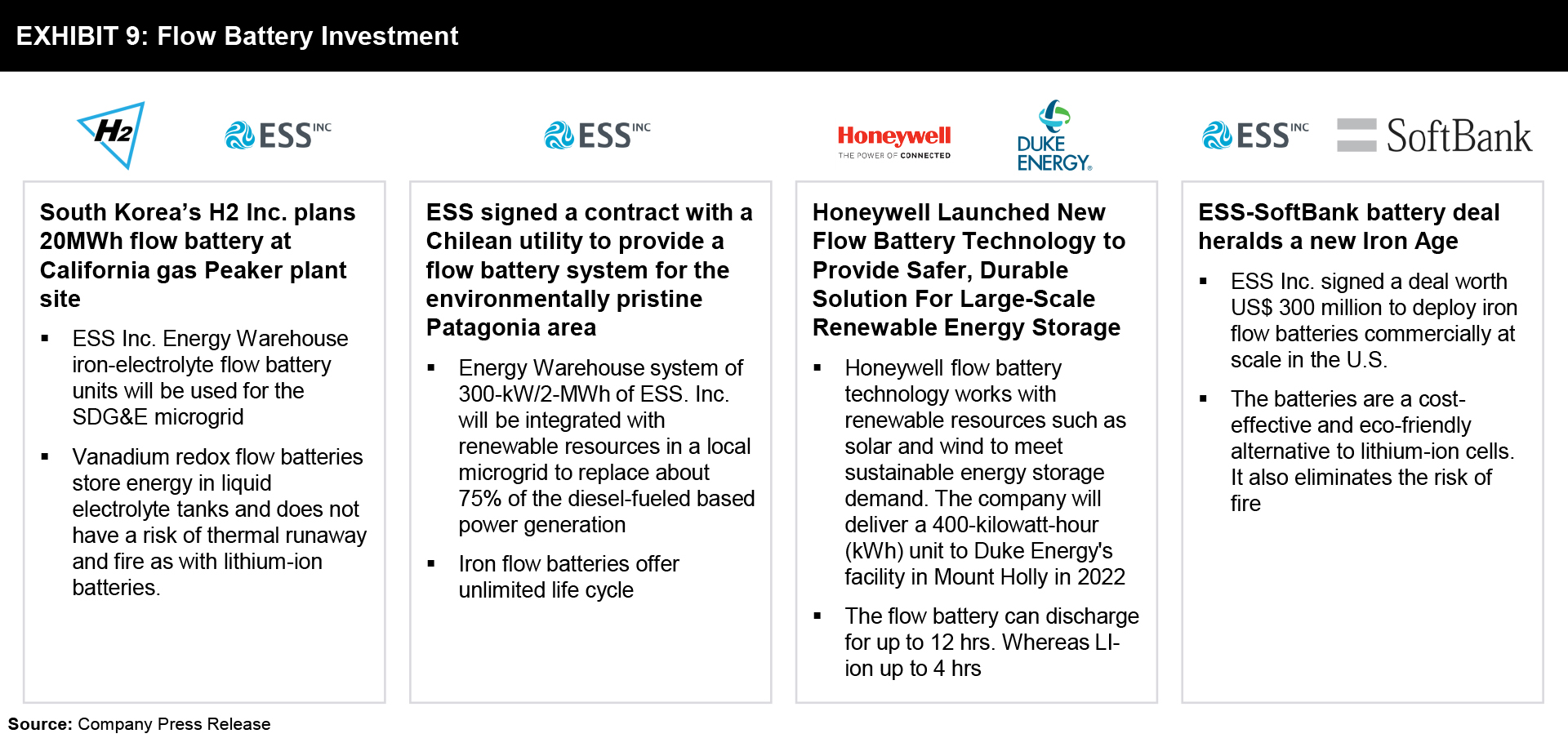

References
- IEA – Annual energy storage deployment by country
- Flow batteries and energy storage— a new market for ceramics
- Energy’s Future – Battery and Storage Technologies
- Flow Batteries: Energy Storage Option for a Variety of Uses
- Energy Storage Grand Challenge: Energy Storage Market Report
- South Korea’s H2 Inc. plans 20MWh flow battery
- ESS – SoftBank battery deal heralds a new Iron Age
- Honeywell Introduces New Flow Battery Technology
- ESS Inc. to Deliver Long-Duration Battery System for Microgrid in Patagonia
Need a thought partner?
Share your focus area or question to engage with our Analysts through the Business Objectives service.
Submit My Business ObjectiveOur Clients
Our long-standing clients include some of the worlds leading brands and forward-thinking corporations.
- © 2021 Cheers Interactive (India) Private Limited. All rights reserved. FutureBridge ® is a registered trademark of Cheers Interactive (India) Private Limited.




































